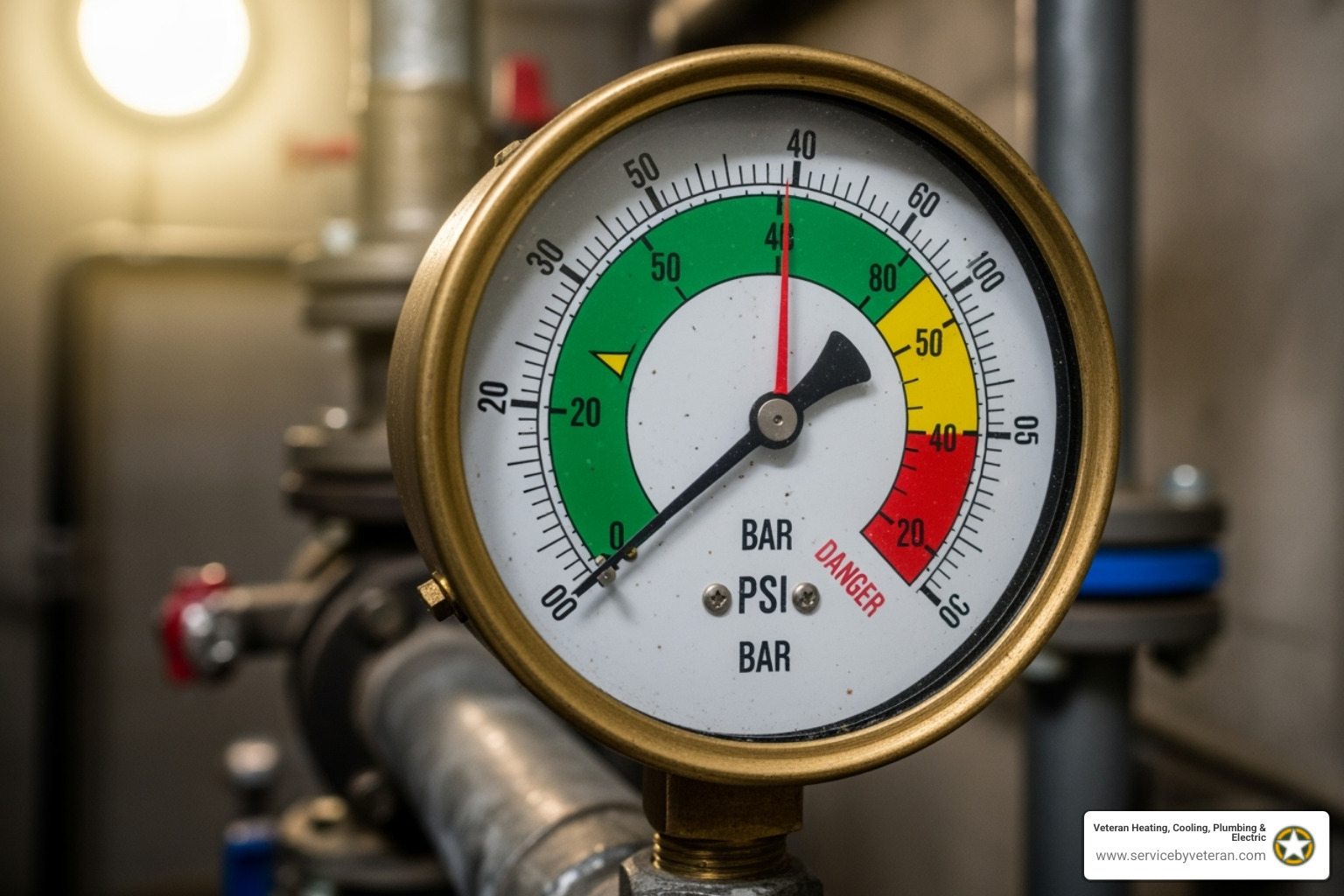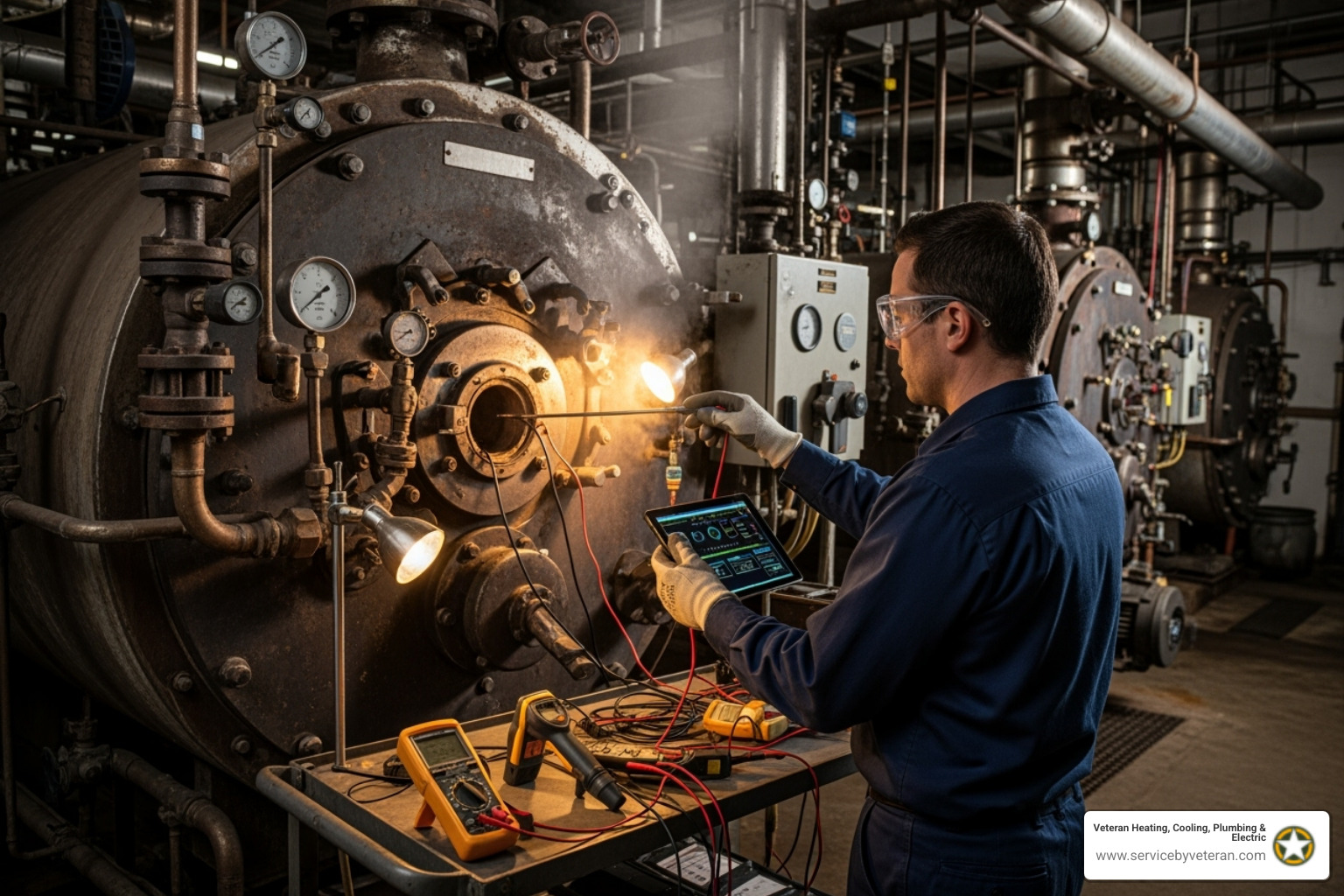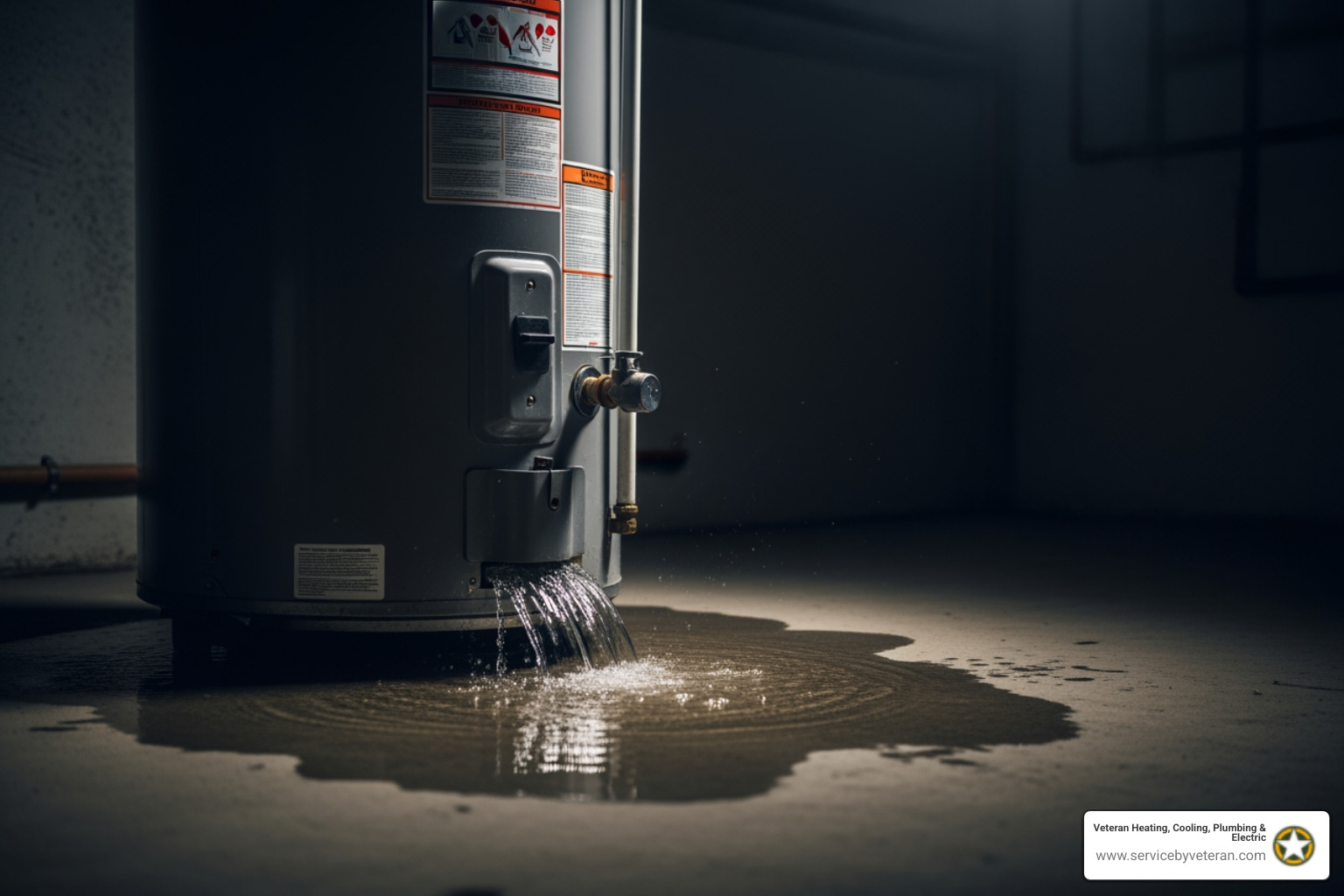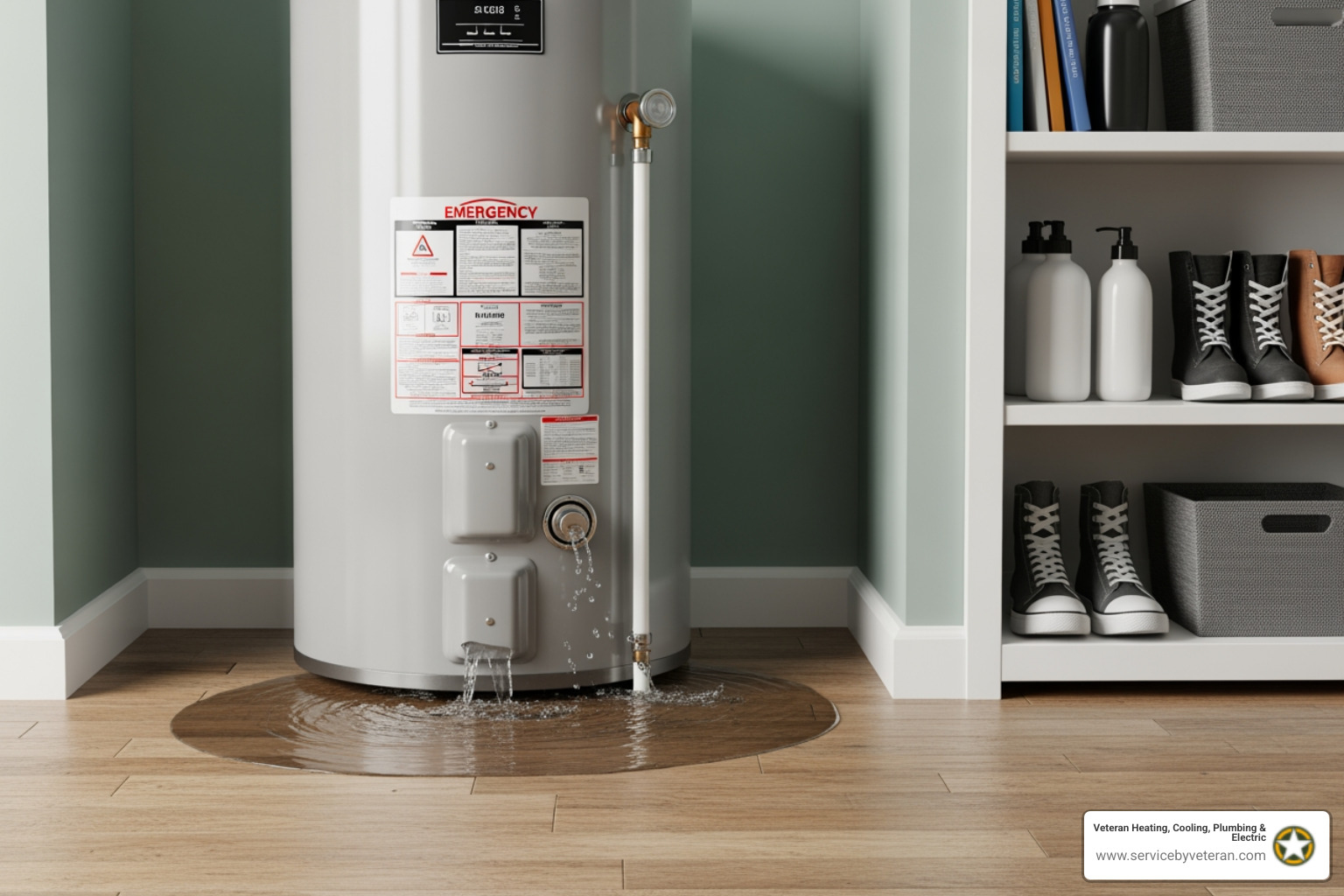Is Your Boiler on the Fritz?
When your home's heating system fails, leaving you without heat or hot water, boiler repair becomes a critical need. From strange noises to a complete shutdown, knowing when to troubleshoot and when to call a professional can save you time, money, and prevent safety hazards.
Quick Answer: Common Signs You Need Boiler Repair
- No heat or hot water - System not producing warmth
- Strange noises - Banging, whistling, or gurgling sounds
- Water leaks - Pooling around the unit or dripping pipes
- Low pressure - Gauge reading below normal range
- Pilot light issues - Won't stay lit or keeps going out
- High energy bills - Sudden spikes in heating costs
- Unusual smells - Gas odors or burning scents
Your boiler is essential for year-round warmth and hot water. When it breaks down, knowing the warning signs is key. Fortunately, 7 out of 10 times a boiler can be repaired on the first visit.
Regular boiler maintenance helps prevent breakdowns and catches minor issues early. Since a malfunctioning boiler can release carbon monoxide, addressing warning signs promptly is a safety priority.
I'm Mike Townsend. My U.S. Army experience with precision cooling systems taught me the importance of attention to detail. I apply that same technical focus to boiler repair, helping homeowners better understand their heating systems.

Decoding the Distress Signals: Common Boiler Problems and Causes
When your boiler acts up, it's sending a warning before things get worse. Understanding these distress signals can save you from a freezing house in the middle of winter. Let's explore what your boiler might be trying to tell you and why these problems happen.
Telltale Signs Your Boiler Needs Repair
Recognizing your boiler's symptoms early can make all the difference. The most obvious sign is no heat or hot water, a complete system failure that could stem from a faulty thermostat or a major component breakdown.
Inconsistent heating, where some rooms are warm and others are cold, suggests your boiler isn't distributing heat properly, often due to trapped air or zone issues.
Leaking water around your boiler should never be ignored. Even small drips can signal serious issues like high pressure, corrosion, or failing seals, and can cause significant water damage.
Your boiler's pressure gauge should be in the green zone, typically between 1 and 2 bar. If the needle drops below this range, your system has lost pressure, possibly from a leak or faulty valve.
For older boilers, a pilot flame that keeps going out often indicates a problem with the thermocouple, a draft, or dirt buildup.
Thermostat troubles can be frustrating. If your boiler isn't responding to temperature changes, there's likely a communication breakdown or internal failure.
Unusual smells require immediate attention. A rotten egg odor could mean a dangerous gas leak, while burning smells might indicate electrical problems.
The Root Causes of Boiler Breakdowns
Behind every symptom is a root cause. Limescale buildup from hard water can create blockages in the heat exchanger and pipes, forcing your boiler to work harder.
System sludge, a mix of rust and debris, gradually clogs your heating system. If you see black water when bleeding a radiator, you have sludge.
Frozen condensate pipes are a common issue for modern condensing boilers in cold weather. If these external pipes aren't insulated, they can freeze and shut down your system.
Faulty pumps and valves disrupt hot water flow. A failed circulation pump stops water from moving, while stuck valves can block flow to certain areas.
Thermocouple failure affects older boilers. This safety device monitors the pilot flame, and if it malfunctions, it shuts off the gas supply.
Trapped air in the system creates cold spots in radiators and reduces heating efficiency.
General wear and tear is inevitable. Over time, seals dry out, electrical connections weaken, and mechanical parts wear down, making regular maintenance crucial.
What's That Noise? Understanding Boiler Sounds
Learning to interpret your boiler's noises can help you catch boiler repair needs early.
Kettling or rumbling sounds like a boiling kettle and is often caused by limescale or sludge restricting water flow in the heat exchanger. This signals inefficiency and potential damage.
Whistling typically indicates mineral buildup in pipes or excessive pressure in the system.
Gurgling often points to trapped air or low water pressure and usually means your system needs bleeding or re-pressurizing.
Banging or clanking can indicate air in the system, low pressure, or a failing component like a pump. Persistent rattling could be a loose valve connection.

The Homeowner's First Response: DIY Checks and Simple Fixes
When your boiler stops working, don't panic. Many boiler repair issues have simple solutions you can handle yourself. Performing these basic checks can also help a technician diagnose the problem faster if you do need to call for service.
Safety first: If you smell gas or suspect a carbon monoxide leak (symptoms include headaches, dizziness, or nausea), evacuate the house immediately and call emergency services. Do not attempt any DIY fixes.

Your Pre-Call Boiler Repair Checklist
These simple checks can often solve the problem and will provide valuable information for a technician if a service call is still needed.
- Check your thermostat settings. Ensure it's on "heat" and set at least 5 degrees above the current room temperature. Also, check for dead batteries if the display is dim or blank.
- Look at your pilot light (on older boilers). It should be a steady blue flame. If it's out, yellow, or orange, it indicates a problem.
- Check your boiler's pressure gauge. The needle should be in the green zone, typically between 1 and 1.5 bar. If it's in the red, you've found an issue.
- Look for error codes on digital displays. Modern boilers often display codes that tell a technician exactly what's wrong. Write them down.
- Check for trapped air by feeling your radiators. If they're cold at the top and warm at the bottom, they need to be bled.
- Verify your power supply. Make sure the boiler is plugged in, the power switch is on, and no circuit breakers have been tripped.
Tackling Low Pressure and Pilot Light Problems
Low pressure is a common boiler repair issue you can often fix yourself. Your boiler needs correct water pressure to circulate hot water effectively.
To re-pressurize your boiler, you'll use the filling loop—a small braided hose with two valves, usually under the boiler. First, turn the boiler off and let it cool. Slowly open both valves on the filling loop and watch the pressure gauge. Once the needle is in the green zone (around 1.2 bar), close both valves firmly. If the pressure drops again quickly, you likely have a leak and should call a professional.
Pilot light problems can be trickier. If the pilot light won't stay lit after you relight it (following the manual's instructions), the thermocouple may need professional attention. A dirty pilot assembly or a draft can also cause issues. Don't keep trying to relight it if it fails repeatedly; this signals a deeper problem requiring professional boiler repair.
When these fixes don't work, or if you're not comfortable trying them, our team is ready to help. We handle everything from basic boiler repair to complex overhauls and also provide Furnace Repair Lakewood services.
When to Call the Pros for Professional Boiler Repair
There comes a time when you need to put down the tools and call a professional. While basic troubleshooting is encouraged, some boiler repair situations involving gas, electricity, or major failures are best left to trained experts.
Red Flags: Situations Demanding an Expert
Some warning signs demand immediate professional attention. In these situations, your family's safety is the top priority.
- The smell of gas (a rotten egg odor) is an emergency. If you smell it, evacuate the house, call your gas provider from a safe distance, and then call for service. Do not attempt any repairs.
- Suspected carbon monoxide issues are equally serious. If your CO detector alarms or family members feel dizzy, nauseous, or confused, evacuate first and call for emergency help.
- Major water leaks that are causing damage to your home require immediate professional intervention to prevent further issues.
- If your system won't power on after you've checked the circuit breakers and power switches, you're likely dealing with an electrical fault that requires an expert.
- If you've gone through the DIY checklist and the boiler still isn't working, it's time to call for professional help.
At Veteran Heating, Cooling, Plumbing & Electric, we're honored to provide Service to Heroes and all homeowners who need reliable, safe heating solutions.
What to Expect from a Professional Service Call
When you call us for boiler repair, our approach is straightforward and honest, designed to restore your home's comfort quickly.
- Initial Diagnosis: Our certified technicians use professional diagnostic tools to pinpoint the problem accurately.
- Clear Explanations: We explain the problem in plain English, so you understand what's wrong and why.
- Transparent Pricing: We provide a written, flat-rate estimate before any work begins, so there are no surprises.
- Repair Authorization: Our technicians only begin work after you approve the estimate. We stock our trucks with common parts to facilitate same-day repairs. In fact, 7 out of 10 times a boiler gets repaired on the first visit.
- System Testing: After the repair, we test the entire system to ensure it's operating safely and efficiently.
How to Choose a Trustworthy Repair Service
Choosing the right company for your boiler repair is crucial. Look for these markers of a quality, reliable service.
- Licensed and Insured: This protects you and ensures the work meets industry standards. Don't hesitate to ask for credentials.
- Certified Technicians: Certifications show a commitment to expertise and ongoing training. Proper certification is especially critical for gas work safety, as shown by resources like the Check the Gas Safe Register.
- Positive Customer Reviews: Look for consistent feedback on reliability, quality work, and fair pricing.
- Transparent Pricing: Reputable companies are upfront about their pricing structure.
- Years of Experience: As a veteran-led, locally owned company, we bring military precision and community accountability to every job.

The Power of Prevention: Boiler Maintenance Essentials
Preventative care is the best way to avoid an emergency boiler repair call. It's about maximizing your investment while keeping your family safe and warm. After years of working with precision equipment in the military, I learned that small maintenance tasks prevent the biggest problems. The same is true for your boiler.
The Long-Term Benefits of Regular Maintenance
Investing in annual boiler maintenance is like a health check-up for your heating system, with benefits that compound over time.
- Prevents Costly Breakdowns: Regular maintenance catches small issues before they become major failures. It's far cheaper to fix a minor part during a planned visit than to handle an emergency shutdown in winter.
- Extends Boiler Lifespan: A well-maintained boiler can last 15-20 years or more, while a neglected one may fail in half that time.
- Improves Energy Efficiency: Clean, calibrated components use less fuel, which can lower your utility bills by 10-15%.
- Ensures Safe Operation: A malfunctioning boiler can release carbon monoxide. During maintenance, we check all safety systems and test for proper combustion and ventilation.
- Maintains Warranty: Most boiler manufacturers require annual professional servicing to keep your warranty valid.
Annual Servicing: What's Included and Why It's Crucial
A boiler should be serviced annually by a qualified technician, ideally in the early fall before the heating season begins. A comprehensive service includes:
- Internal Component Cleaning: Removing soot and debris from the burner, heat exchanger, and ignition system.
- Flue and Combustion Analysis: Ensuring the boiler is burning fuel properly and venting safely.
- Safety Device Testing: Checking that pressure relief valves, thermostats, and other controls are working correctly.
- Seal and Gasket Inspection: Looking for wear or potential leaks to prevent water and gas leaks.
- Pressure and Flow Checks: Verifying that water is moving through your system correctly.
To simplify this process, we offer Maintenance Plans that ensure your system gets the attention it needs.
Boiler Types and Energy Efficiency
All boiler types benefit from regular maintenance.
- Combi Boilers provide both heating and hot water on demand. Their complex internal parts, like the diverter valve, require regular checks.
- System Boilers use a hot water cylinder, making them ideal for larger homes with higher hot water demand.
- Regular (Conventional) Boilers use both a hot water cylinder and cold water tanks, suitable for homes with multiple bathrooms.
Maintenance boosts efficiency because clean components work better. A clean heat exchanger and burner use less fuel to produce the same amount of heat. High-efficiency models with ENERGY STAR® ratings are even more effective but still require regular servicing to perform at their best. You can Learn about ENERGY STAR® rated systems to compare modern boilers.
The bottom line is that regular maintenance isn't an expense—it's an investment in your home's comfort, safety, and financial well-being.
Frequently Asked Questions about Boiler Repair
Homeowners often ask the same questions when their heating systems act up. Here are the answers to some of the most common concerns about boiler repair.
How often should my boiler be serviced?
The simple answer is once a year, every year. Annual servicing is preventative care that catches problems before they become emergencies. A professional technician will ensure your system runs safely and efficiently.
Crucially, most manufacturer warranties require annual servicing to remain valid. Skipping it could leave you responsible for the full cost of repairs that would otherwise be covered. Regular maintenance is the best way to prevent unexpected breakdowns during the coldest months.
What are the most dangerous boiler problems?
Some boiler issues are more than just an inconvenience; they can be life-threatening.
- Carbon monoxide leaks are the most serious danger. This invisible, odorless gas is produced by incomplete fuel combustion. A malfunctioning boiler can release unsafe levels, which is why working CO detectors are essential.
- Gas leaks are another major hazard. If you smell a rotten egg odor, evacuate immediately and call for emergency help from a safe location.
- Electrical malfunctions can cause fires or dangerous shocks. Never tamper with your boiler's wiring.
- Major water leaks, while not immediately life-threatening, can cause extensive property damage, lead to mold growth, and create electrical hazards.
Never attempt to fix these dangerous issues yourself. That's what professionals are for.
Is it worth repairing an old boiler?
This is a common and important question. The right answer depends on your specific situation, but several key factors can guide your decision.
- Age: If your boiler is over 15 years old, it's likely far less efficient than modern units and may need frequent repairs.
- Cost of Repair: A good rule of thumb is that if a repair costs more than half the price of a new boiler, replacement is usually the better financial choice.
- Energy Efficiency: A new high-efficiency boiler can convert up to 98% of fuel into heat, compared to 60-80% for older models. These savings add up quickly on your monthly bills.
- Frequency of Breakdowns: If you are calling for boiler repair services regularly, your system is likely nearing the end of its life.
Repairing an older boiler often means lower upfront costs but higher long-term expenses due to poor efficiency and recurring repairs. Replacing with a new boiler is a larger initial investment but provides lower long-term costs, higher efficiency, better reliability, and a new warranty for peace of mind. We can provide an honest assessment to help you make the best decision for your home and budget.
Conclusion: Keep Your Home Warm and Safe
Understanding boiler repair helps you face heating issues with confidence. You can now recognize telltale signs like strange noises, leaks, pressure drops, and pilot light problems. Signs like no heat, unusual sounds, leaks, or low pressure are your boiler's way of asking for help before a small issue becomes a major one.
Simple DIY checks like verifying thermostat settings or checking the pressure gauge can often solve the problem. However, we've also highlighted critical red flags where professional help is essential for your safety.
Safety always comes first. A malfunctioning boiler can release dangerous carbon monoxide, and gas leaks pose serious risks. If you smell gas, suspect a CO leak, or face a major system failure, call a professional immediately.
The best way to avoid emergency boiler repair is through prevention. Annual maintenance is your best insurance policy against costly breakdowns, unsafe conditions, and high energy bills. A well-maintained boiler runs efficiently, lasts longer, and keeps your family safe.
When you need trusted expertise, Veteran Heating, Cooling, Plumbing & Electric brings military precision to every service call. Our veteran-led team provides a lifetime warranty on parts and labor and a money-back guarantee, serving Denver, Lakewood, Littleton, and surrounding areas with dedication. Don't let a failing boiler leave you in the cold. Stay vigilant, perform simple checks, and call a team that puts your safety and comfort first.



